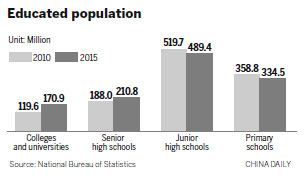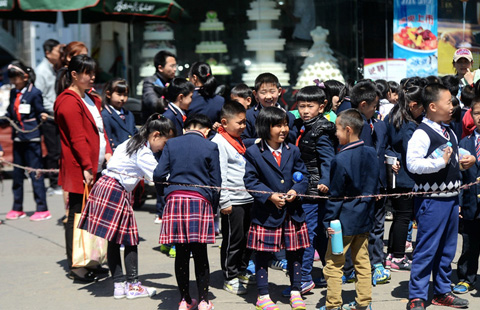As country's population has grown, so has the level of higher education
By China Daily (China Daily) Updated: 2016-04-21 08:06China saw its population grow last year, along with an improved male-female ratio and the level of education, according to a survey from the National Bureau of Statistics that was released on Wednesday.
The Chinese mainland had a population of 1.37 billion, an increase of 33.77 million people over the census taken in 2010, meaning the annual growth rate was 0.5 percent.
The survey, which was started on Nov 1, queried 21.31 million people, some 1.55 percent of the total population, a statement on the bureau's official website said.
Among the trends noted in the survey was an increase in the level of people's educations.
The number of people holding degrees from colleges or universities reached 170.9 million, which means there were 12,445 people with an advanced education per 100,000 people in 2015, up from 8,930 in 2010.
The number of people who had attended a senior high school also increased, and the number who had only completed lower-level education fell.
The improvements in education levels mirrored the development of China's education system.
Independent research into China's education situation showed that overall education development was better than the world average last year, Yuan Guiren, minister of education, said in March.
The latest survey also showed the country had a narrower gap between genders in 2015.
Last year, there were 105 males for every 100 females - a change from 2010, when there were 105.2 males for every 100 females.
In addition, the urban population has increased and now represents 55.88 percent of the total population, an increase of 6.2 percent over the census of 2010.

- Study finds plummeting levels of physical activity among Chinese adults
- School not at fault, its principal insists
- Xi says advice from netizens welcome
- China to help more rural migrants settle in cities
- Expert says big quake unlikely to hit nation soon
- Habit of reading in China expands with mobile tech
- Pollution poses threat to cities' water
- Man, 57, detained in courier beating captured on video
- Embryos growing in space a 'giant leap'
- 500 students sickened at school built on toxic site








